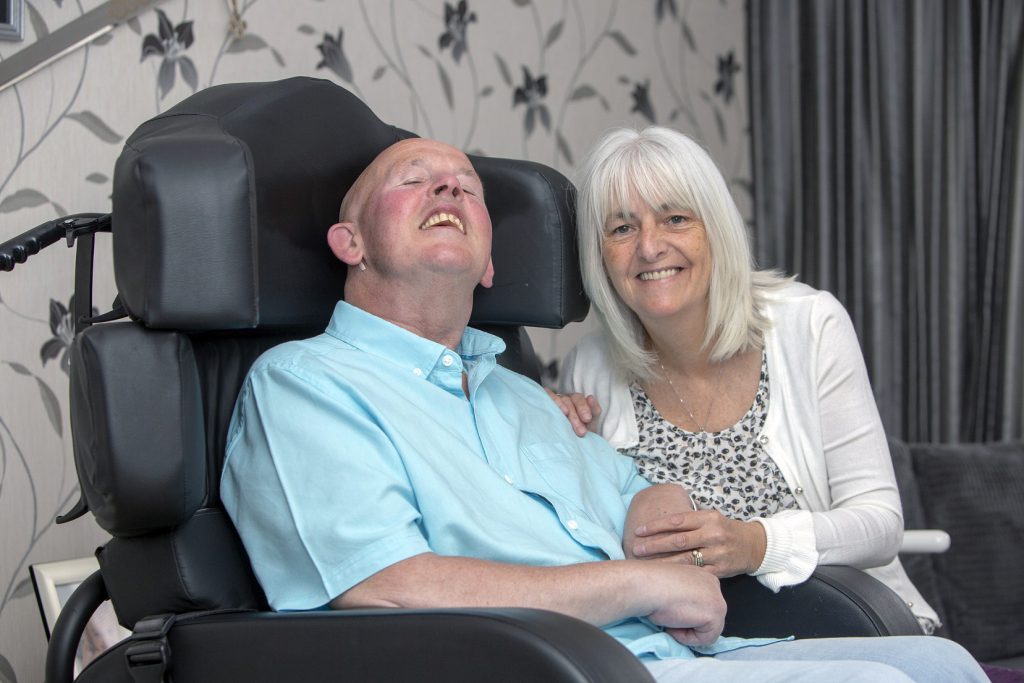What is MND
Find support
I have MND
I am supporting someone
Get involved
Research
About MND Scotland

Michael has spent the majority of his life working in construction, starting off as a teenager building fishing boats at Dunbar harbour. He later moved on to joinery, working on projects all over the UK including the Falkirk Wheel. Michael spent his later years working as a cleaner at Torness Power Station.
He is married to Irene (62). The couple married in Dunbar in 2011. Michael is a father of 4, step-father of 2, grandfather of 6 and step-grandfather of 4.
In addition to his Monday-Friday job, Michael spent his weekends caring for two men in the community for 8 years. This prompted Michael’s loved ones to label him a “workaholic”.
But now Michael’s diagnosis with MND means that he has to be cared for himself.
MND is a rapidly progressing terminal illness, which stops signals from the brain reaching the muscles. This may cause someone to lose the ability to walk, talk, eat, drink or breathe unaided.
Since his diagnosis with MND in December 2016, Michael’s progression with MND has been short but rapid. Today Michael has very limited mobility and he relies on a communications aid to speak, although even this can be a struggle.
Irene helps Michael tell his story:
“We noticed the first symptoms in May 2016. Michael started having problems with biting his tongue at night and we noticed that his speech started to slur slightly. He also had some emotional liability, crying a lot for no reason. When Michael started laughing he couldn’t stop – and then I would start laughing and neither of us knew what we were laughing at.
“Then Michael’s voice started to go and that’s when I forced Michael to go to the GP, so I booked the appointment and we went. We thought that Michael had maybe suffered a mini stroke but he came back clear on every test. Each time a different test came back clear, I got more and more worried.”
It was over 6 months later, in December 2016, that the couple finally found out that Michael has MND.
“When they told us that it was MND the reaction was just one of shock. Michael felt incredibly sad at first and that turned into anger at what was happening to him. Michael had always been an active, 7-days a week worker – I used to call him ‘the machine.’ He always had to be doing something, he couldn’t even sit and watch a film, his brain never stopped.”
In the 2 years since his diagnosis with MND, Michael’s condition has deteriorated significantly. In January 2017 Irene decided to retire from her role at a local hotel to become Michael’s full-time carer.
“I thought it would be difficult for Michael to accept, going from a carer to being cared for. Michael’s always been so busy and proactive, but he actually found it easier to accept carers because he knew what to expect to an extent.”
In addition to the massive change in his lifestyle after being diagnosed with MND, Michael has also had to deal with a lack of understanding around the condition and its symptoms.
Throughout MND Awareness Week, MND Scotland is running a ‘myth-busting’ campaign to help highlight and challenge some of the misconceptions that exist around MND.
“Before Michael was diagnosed he was having some problems with his speech and people thought he was drunk. We were in a pub in Edinburgh during the Festival in 2016 and the girl at the bar was going to refuse to serve him because she said he’d had enough. I had to go up to the bar and explain, I know why you think that, but Michael has a medical condition.
“It was really awkward and Michael was absolutely mortified. I don’t think it was her fault, but I think it shows how far we have to go to raise awareness of MND and its symptoms.”
Using his LiteWriter, Michael takes the time to type out a short sentence to share some of the misconceptions that he has faced while living with MND.
Michael uses his LiteWriter to type a short message: “People shout at me and treat me like a child.”
Irene continues: “I think some people see him in a wheelchair and see that he can’t move or speak and they do think there’s something wrong with his brain. We met Michael’s son Jonathan, while we were out at the shops. We hadn’t seen him in a long time and when he came over he said to me: ‘Can he hear me; can he understand me?’
“I just had to say, there’s nothing wrong with his brain, he’s still as sharp as a tack. I feel like I have to keep telling everybody that because they think it’s affected his brain because he can’t speak.”
Despite their ups and downs with MND the couple are grateful for all the help and support that the charity MND Scotland has provided them with.
Irene said: “MND Scotland has been fantastic. They gave us a grant which we put towards buying an accessible car for Michael to get out and about. We use the car every day and we would be totally stuck without it. With the car we can get out to the shops, appointments and also to the MND Scotland Support Group in Edinburgh which Michael gets a lot out of.”
Visit mndscotland.org.uk/MNDaware for more information about MND Scotland’s ‘Myth-Busting MND’ campaign.
If you have a story you’d like to share, please get in touch with Niamh Callan and Craig Watson in the Communications team at communications@mndscotland.org.uk.
Sign up
for newsletter
Get the latest news and events straight to your inbox.
You can help create a world without MND